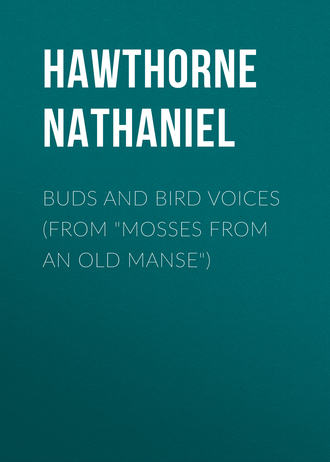
Натаниель Готорн
Buds and Bird Voices (From "Mosses from an Old Manse")
The trees in our orchard and elsewhere are as yet naked, but already appear full of life and vegetable blood. It seems as if by one magic touch they might instantaneously burst into full foliage, and that the wind which now sighs through their naked branches might make sudden music amid innumerable leaves. The mossgrown willow-tree which for forty years past has overshadowed these western windows will be among the first to put on its green attire. There are some objections to the willow; it is not a dry and cleanly tree, and impresses the beholder with an association of sliminess. No trees, I think, are perfectly agreeable as companions unless they have glossy leaves, dry bark, and a firm and hard texture of trunk and branches. But the willow is almost the earliest to gladden us with the promise and reality of beauty in its graceful and delicate foliage, and the last to scatter its yellow yet scarcely withered leaves upon the ground. All through the winter, too, its yellow twigs give it a sunny aspect, which is not without a cheering influence even in the grayest and gloomiest day. Beneath a clouded sky it faithfully remembers the sunshine. Our old house would lose a charm were the willow to be cut down, with its golden crown over the snow-covered roof and its heap of summer verdure.
The lilac-shrubs under my study-windows are likewise almost in leaf: in two or three days more I may put forth my hand and pluck the topmost bough in its freshest green. These lilacs are very aged, and have lost the luxuriant foliage of their prime. The heart, or the judgment, or the moral sense, or the taste is dissatisfied with their present aspect. Old age is not venerable when it embodies itself in lilacs, rose-bushes, or any other ornamental shrub; it seems as if such plants, as they grow only for beauty, ought to flourish always in immortal youth, or, at least, to die before their sad decrepitude. Trees of beauty are trees of paradise, and therefore not subject to decay by their original nature, though they have lost that precious birthright by being transplanted to an earthly soil. There is a kind of ludicrous unfitness in the idea of a time-stricken and grandfatherly lilac-bush. The analogy holds good in human life. Persons who can only be graceful and ornamental – who can give the world nothing but flowers – should die young, and never be seen with gray hair and wrinkles, any more than the flower-shrubs with mossy bark and blighted foliage, like the lilacs under my window. Not that beauty is worthy of less than immortality; no, the beautiful should live forever, – and thence, perhaps, the sense of impropriety when we see it triumphed over by time. Apple-trees, on the other hand, grow old without reproach. Let them live as long as they may, and contort themselves into whatever perversity of shape they please, and deck their withered limbs with a springtime gaudiness of pink blossoms; still they are respectable, even if they afford us only an apple or two in a season. Those few apples – or, at all events, the remembrance of apples in bygone years – are the atonement which utilitarianism inexorably demands for the privilege of lengthened life. Human flower-shrubs, if they will grow old on earth, should, besides their lovely blossoms, bear some kind of fruit that will satisfy earthly appetites, else neither man nor the decorum of nature will deem it fit that the moss should gather on them.
One of the first things that strikes the attention when the white sheet of winter is withdrawn is the neglect and disarray that lay hidden beneath it. Nature is not cleanly according to our prejudices. The beauty of preceding years, now transformed to brown and blighted deformity, obstructs the brightening loveliness of the present hour. Our avenue is strewn with the whole crop of autumn's withered leaves. There are quantities of decayed branches which one tempest after another has flung down, black and rotten, and one or two with the ruin of a bird's-nest clinging to them. In the garden are the dried bean-vines, the brown stalks of the asparagus-bed, and melancholy old cabbages which were frozen into the soil before their unthrifty cultivator could find time to gather them. How invariably, throughout all the forms of life, do we find these intermingled memorials of death! On the soil of thought and in the garden of the heart, as well as in the sensual world, he withered leaves, – the ideas and feelings that we have done with. There is no wind strong enough to sweep them away; infinite space will not garner then from our sight. What mean they? Why may we not be permitted to live and enjoy, as if this were the first life and our own the primal enjoyment, instead of treading always on these dry hones and mouldering relics, from the aged accumulation of which springs all that now appears so young and new? Sweet must have been the springtime of Eden, when no earlier year had strewn its decay upon the virgin turf and no former experience had ripened into summer and faded into autumn in the hearts of its inhabitants! That was a world worth living in. O then murmurer, it is out of the very wantonness of such a life that then feignest these idle lamentations. There is no decay. Each human soul is the first-created inhabitant of its own Eden. We dwell in an old moss-covered mansion, and tread in the worn footprints of the past, and have a gray clergyman's ghost for our daily and nightly inmate; yet all these outward circumstances are made less than visionary by the renewing power of the spirit. Should the spirit ever lose this power, – should the withered leaves, and the rotten branches, and the moss-covered house, and the ghost of the gray past ever become its realities, and the verdure and the freshness merely its faint dream, – then let it pray to be released from earth. It will need the air of heaven to revive its pristine energies.







